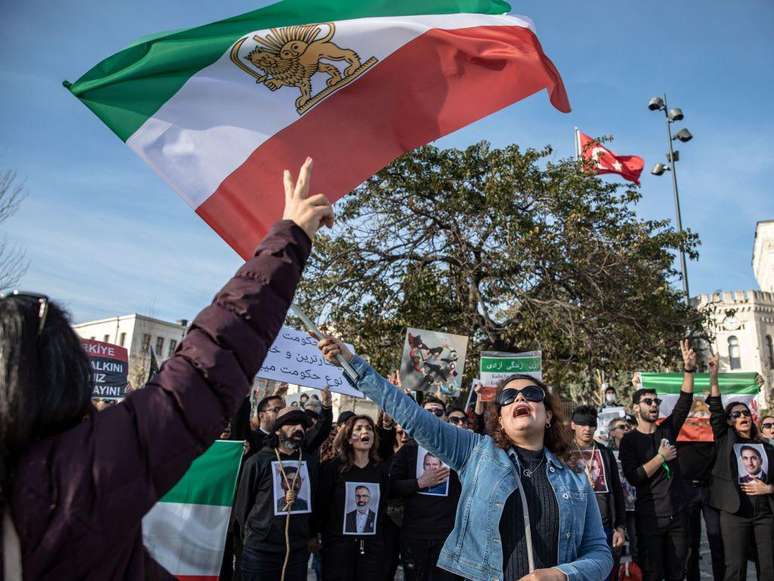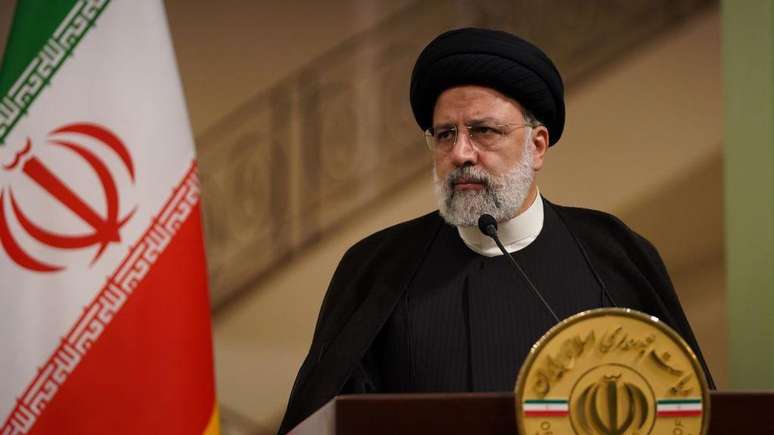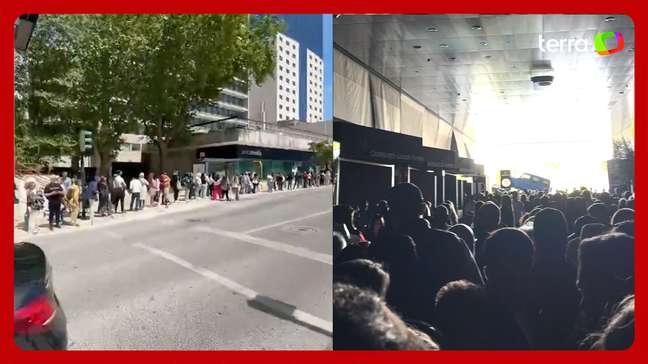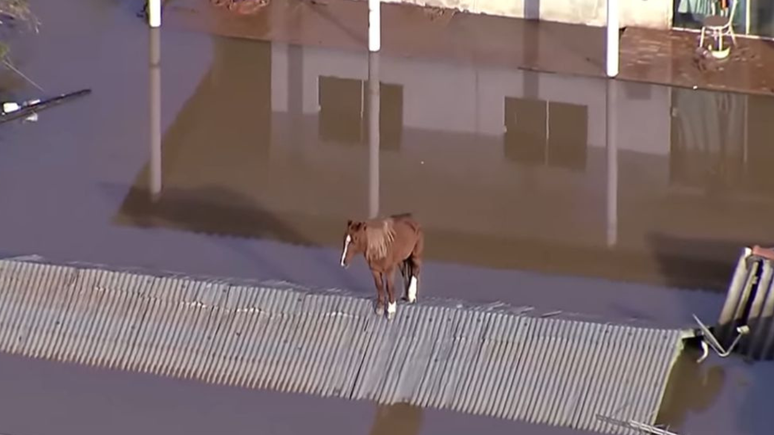We explain three crucial points to understand the incident and the impact of Raisi’s death on the political scenario in Iran and the region
The President of Iran Ebrahim Raisi died on Sunday 5/19 in a helicopter crash, as reported by the Iranian state press.
The plane crashed in a mountainous region in the north-west of the country, while flying in thick fog.
In addition to Raisi, the helicopter was also carrying Foreign Minister Hossein Amir-Abdollahian.
After an intense search and rescue operation that began on Sunday, the Red Crescent, a humanitarian organization operating in the Middle East, confirmed this Monday (20/5) that the bodies of the president and other victims of the accident have been recovered .
Below we explain three crucial points for understanding the incident and the impact of Raisi’s death on the political scenario in Iran and the region.
What is known about the accident?
The Iranian president was in a helicopter convoy traveling to Tabriz, a city in northwest Iran, and crashed in thick fog. The local press attributed the accident to bad weather.
The helicopter was found completely burnt out. Iran’s air fleet is old and suffers from an inability to renew or even replace parts due to a series of sanctions imposed decades ago against the country, most recently due to the country’s nuclear program.
Local press speculate that the plane the president was on had not received spare parts since 1986.
While there are plausible explanations for the crash, the helicopter crash has raised questions about the possible involvement of internal and external enemies. Iranian state media have not reported it so far.
BBC international editor Jeremy Bowen makes some important points.
“Raisi had many enemies and many people will be happy with his death. Only in the 1980s did he actually sign the death warrant of thousands of dissidents, especially left-wing ones. Since he took over the presidency in 2021, he has been involved in a serious repression.”
“Moreover, he was suggested to take over the main job [de líder supremo da República Islâmica]and I imagine it [uma queda de helicóptero] It’s a good way to get a rival out of the way. But we have no evidence of this.”
The journalist underlines that, in Iran, there is always “the instinct to blame Israel”.
“Israeli officials have told reporters that they are not involved in any of this. It is difficult to see how Israel would benefit from something that would be interpreted, in practice, as a provocative act of war. [contra o Irã].”
Who was Raisi?
Raisi was a “hardline” cleric close to Ayatollah Ali Khamenei, Iran’s supreme leader since 1989.
He won the presidency in 2021 after a significant victory at the polls, even though many prominent moderate and reformist candidates were barred from the election and most voters abstained from voting.
The 2021 election was important for two reasons: First, it consolidated power in the hands of conservatives. Raisi, in turn, was considered one of the most conservative presidents in Iran’s recent history.
Second, these elections consolidated the idea that Ali Khamenei, now 85, saw Raisi as a potential successor.
Raisi’s tenure was marked by anti-government protests in 2022, triggered by the death of young Mahsa Amini, who died while in police custody after being arrested by Iran’s morality police for allegedly failing to wear the Islamic headscarf correctly.
The episode culminated in demonstrations, with young people taking to the streets and images of women burning their veils and cutting their hair in public.
The Raisi government responded with a violent crackdown: according to UN estimates, around 550 protesters were killed by security forces, most by gunfire.

During his tenure, tensions in the Middle East also rose to their highest levels in decades, with war between Israel and the Palestinian group Hamas, which is part of a group of Iranian-funded countries and organizations within the so-called “Iran axis”. resistence”. “.
Amid this escalation of clashes, Raisi supported Iran’s decision to carry out its first direct attack against Israel in April 2024.
More than 300 drones and missiles were fired against Israeli territory, in retaliation for an attack against the Iranian consulate in Syria attributed to Israel.
Most of them were intercepted by the anti-missile systems of Israel and its allies, but the episode raised fears of a wider regional war and prompted Israel to retaliate with an attack on an Iranian air base.
Raisi made a career in the judiciary after the Islamic revolution of 1979 and ended up linked to one of the darkest episodes that occurred in Iran in the 1980s: what would become known as the “death committee”.
He was one of four secret tribunal judges who tried thousands of political prisoners, mostly belonging to the leftist group. This is one reason why Raisi had many enemies, even within Iran itself.
Human rights groups say these courts have sentenced thousands of Iranians to death, who have been executed and buried in mass graves. Raisi denied taking part in these death sentences, but said they were justifiable.
Iran is a totalitarian country that prevents the functioning of a free press. The BBC, for example, has been banned from operating on Iranian territory since 2019, and journalists who are part of the Persian service must report from other countries.
What is the impact of the death on Iran and the region?
According to the structure adopted by the 1979 Islamic Revolution, the person who effectively determines the direction of the Iranian Republic is the supreme leader, currently Ali Khamenei.
He is both head of state and commander-in-chief of the security forces, having ultimate authority over the national police, the moral police, as well as two major forces: the Revolutionary Guard, an elite group responsible for internal security, and the volunteer group Basij Resistance Force, used to repress dissent in the country.
The president occupies a position just below in the hierarchy, alongside the judiciary, Parliament, the Guardian Council and the armed forces.
In practice, the president is responsible for leading the government structure, with great influence on domestic and foreign policy.
After Raisi’s death, new elections must be held within 50 days, as required by the Iranian Constitution, under the supervision of Vice President Mohammad Mokhber, who has already declared that there will be no rupture in the government.
Now analysts and diplomats are assessing the impact of Raisi’s death on domestic and regional politics.
While opponents inside and outside the country may see an opportunity for regime change, this is considered unlikely by most observers given that the country’s elections are not truly democratic.
BBC correspondent Lyse Doucet lists the reactions so far: “Among Iran’s allies, the so-called ‘axis of resistance’ in the region, there have been a number of expressions of condolences and prayers for the continuity of the Islamic Republic of Iran On the other hand, there was an almost silent reaction from other countries in the world, with which Iran’s relations were more difficult and tense.”
For diplomats it is always a “moment of respect, especially in the face of the tragic and unexpected death, in a helicopter crash, not only of the president of Iran, but also of Foreign Minister Hossein Amir-Abdollahian, who represented the ‘Iran in terms of diplomacy in the capitals of the world.’
“Diplomacy surrounding tensions in the Israel-Gaza war and Iran’s efforts to ease the impact of debilitating tensions and the efforts of many countries to isolate them have been central issues,” Doucet concludes.
Analysts consulted by the BBC do not believe Iran’s direction will change dramatically, but that it will be an endurance test for conservatives who dominate all spheres of politics and society.
“The system [político iraniano] will make a great show from death [de Raisi] and maintain constitutional procedures, to demonstrate functionality, while seeking a new name that can maintain conservative unity and loyalty to Khamenei,” says Sanan Vakil, director of the Middle East and North Africa program at Chatham House.
Source: Terra
Rose James is a Gossipify movie and series reviewer known for her in-depth analysis and unique perspective on the latest releases. With a background in film studies, she provides engaging and informative reviews, and keeps readers up to date with industry trends and emerging talents.








